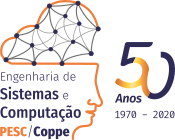Rejection-Oriented Learning Without Complete Class Information
Autores
|
6389 |
131,2339,2897
|
|
|
6390 |
131,2339,2897
|
|
|
6391 |
131,2339,2897
|
Informações:
Publicações do PESC
Aprendizado de Máquina é comumente usado para apoiar a tomada de decisão em numerosos e diversos contextos. Sua utilidade neste sentido é inquestionável: existem sistemas complexos baseados em técnicas de aprendizado de máquina cujas capacidades descritivas e preditivas vão muito além das dos seres humanos. Contudo, esses sistemas ainda possuem limitações, cuja análise permite estimar sua aplicabilidade e confiança em vários casos. Isto é interessante considerando que a abstenção da provisão de uma resposta é preferível a cometer um equívoco ao realizar tal ação. No contexto de classificação e tarefas similares, a indicação desse resultado inconclusivo é chamada de rejeição. A pesquisa que culminou nesta tese proporcionou a concepção, implementação e avaliação de sistemas de aprendizado orientados à rejeição para duas tarefas distintas: reconhecimento em cenários abertos e agrupamento de dados em fluxo contínuo. Estes sistemas foram derivados da rede neural artificial WiSARD, que teve a modelagem de rejeição incorporada a seu funcionamento. Este texto detalha e discute tais realizações. Ele também apresenta resultados experimentais que permitem avaliar a importância científica e prática da metodologia de ponta proposta.
Machine Learning is commonly used to support decision-making in numerous, diverse contexts. Its usefulness in this regard is unquestionable: there are complex systems built on the top of machine learning techniques whose descriptive and predictive capabilities go far beyond those of human beings. However, these systems still have limitations, whose analysis enable to estimate their applicability and confidence in various cases. This is interesting considering that abstention from the provision of a response is preferable to make a mistake in doing so. In the context of classification-like tasks, the indication of such inconclusive output is called rejection. The research which culminated in this thesis led to the conception, implementation and evaluation of rejection-oriented learning systems for two distinct tasks: open set recognition and data stream clustering. These system were derived from WiSARD artificial neural network, which had rejection modelling incorporated into its functioning. This text details and discuss such realizations. It also presents experimental results which allow assess the scientific and practical importance of the proposed state-of-the-art methodology.





